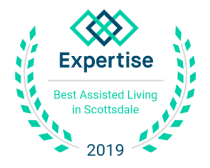The holiday season is a wonderful opportunity to spend quality time with friends and family while creating lasting memories, for children and aging parents alike. There are always the usual stresses that arise this time of year, like making sure gifts are bought, meals are sorted, and activities are planned to keep everyone happy. However, […]
 When you are trying to decide whether to move your senior into assisted living center or keep them in their own home and arrange care to come to them, so many questions come up; it can be overwhelming. Don’t panic. Start by answering these four questions. It is a good first step to help you decide what makes the most sense for not just your loved one, but your whole family.
When you are trying to decide whether to move your senior into assisted living center or keep them in their own home and arrange care to come to them, so many questions come up; it can be overwhelming. Don’t panic. Start by answering these four questions. It is a good first step to help you decide what makes the most sense for not just your loved one, but your whole family.
1. Which costs more: assisted living centers or private home care?
There is no simple answer here. When you compare the cost of an assisted living center vs bringing care into the home, remember to include mortgage, rent, utilities, maintenance of the home, meals, along with the cost of any medical or personal care needed. What kind of medical care your loved one needs will also have a major impact on the cost. Some other things to think about: will there be a need for someone to assist with non-medical issues, such as driving, running errands, general companionship? All these things affect the total cost.
In terms of considering an assisted living center, the biggest factor impacting cost will be the level of care your senior needs. Other things that to factor in include, the size of the room, whether or not it has a private bathroom and the staff ratio and education. When researching the options, ask for a detailed list of all costs, possible expenses and any additional fees the community may have, so you can make a detailed comparison.
An important issue to think about when comparing costs is location. Where your loved one lives or the location of where you need assisted living, significantly affects the potential costs. Prices fluctuate greatly depending on location. Assisted living centers in remote areas where demand exceeds supply may cause low availability for accommodations and a higher price tag. However, urban areas that carry a higher cost of living, in general, may prove more expensive. This is where you just have to do your homework.
2. Will my loved one feel at home?
This question looms largest in the mind of most people seeking out an assisted living community for their loved ones. Answering this question means communicating with the potential caregivers of your loved one. Do the rooms in a potential assisted living home come fully furnished or can your senior bring pieces of his or her own furniture or other belongings? Are there common areas which allow for your family to visit and spend time? How much input do you have with the cook and making sure meals include old favorites? What activities are available for residents? Knowing this information will help you get an idea of whether or not an assisted living home will feel that way to your loved one.
Assisted living centers run the spectrum, from simple, bare bones to high-end luxury Many have a variety of amenities including fitness classes, spa areas, gardens, and organized activities. Ask questions not just of potential caregivers, but of your loved one, so you will have a clear idea of what things matter most and what makes a place feel like “home” to him or her.
3. Will this be a safe environment?
The question of safety is really what triggers a family to seek out assisted living for their senior in the first place. At some point, keeping their loved one in their home no longer feels like the safest option. Sometimes it’s because their senior lives in a remote area or the house itself poses problems because of stairs or other hazards. Trying to retrofit a loved one’s home to be safe for an elderly person in need of significant daily care, and to accommodate personnel brought in to provide that care, can prove very difficult, if not impossible. This is where it would benefit both the family and the loved one to seek out expert advice on whether bringing the assistance into the home will make for a safe environment.
When considering an assisted living community, ask how residents are kept safe. What is the staffing ratio? What happens at night? Is there a caregiver on site and awake in the early hours? What about medical staff? Who oversees the medical care of your loved one and is this person available 24/7? What security systems does the assisted living community use to maintain safety for its residents? What are the protocols for making sure everyone is where they are supposed to be when they are supposed to be there?
4.Will my senior be able to receive the care needed?
Many assisted living centers offer different levels of care for their residents. Depending on the community’s licensing, assisted living facilities can offer skilled nursing, personal care staff, or services from home health agencies. Assisted living centers have experts who can assess the level of care your loved one needs. Getting this right is crucial to ensure your senior gets the appropriate level of care.
One of the primary goals for medical care of the elderly is to make every day more comfortable. Providing this care often comes down to the ratio of caregivers to residents. This is something to ask about when exploring assisted living communities. Is there enough staff to keep your loved one comfortable and well-cared for? You are looking for caregivers that you can imagine becoming an extended member of your family: caregivers you can trust to treat your loved one the way you would treat them in your home. These caregivers will be the ones keeping track of medications, helping your loved one move, eat, bathe and do other activities. They will get to know your senior’s needs quickly. It’s important you feel good about the people who will be taking care of your loved one.
We know that deciding on assisted living for your senior can be difficult. At Paradise Living Centers, we are happy to answer any questions you may have. If you would like to learn more about Paradise Living Centers and get your questions answered, contact us at (480) 878-4112.



